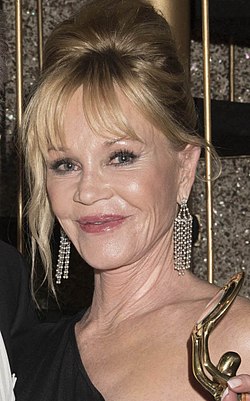Melanie Griffith Quotes
About Author
Melanie Richards Griffith (born August 9, 1957) is an American actress. Born in Manhattan to actress Tippi Hedren, she was raised mainly in Los Angeles, where she graduated from the Hollywood Professional School at age 16. In 1975, 17-year-old Griffith appeared opposite Gene Hackman in Arthur Penn's neo-noir film Night Moves. She later rose to prominence as an actor in films such as Brian De Palma's Body Double (1984), which earned her a National Society of Film Critics Award for Best Supporting Actress. Griffith's subsequent performance in the comedy Something Wild (1986) attracted critical acclaim before she was cast in 1988's Working Girl, which earned her a nomination for the Academy Award for Best Actress and won her a Golden Globe.
In the 1990s, Griffith performed in a series of roles which received varying critical reception. She received Golden Globe nominations for her performances in Buffalo Girls (1995), and as Marion Davies in RKO 281 (1999), while also earning a Golden Raspberry Award for Worst Actress for her performances in Shining Through (1992), as well as receiving nominations for Crazy in Alabama (1999) and John Waters' cult film Cecil B. Demented (2000). Other credits include John Schlesinger's Pacific Heights (1990), Milk Money (1994), the neo-noir film Mulholland Falls (1996), as Charlotte Haze in Adrian Lyne's Lolita (1997), and Another Day in Paradise (1998).
She provided the voice of Margalo in Stuart Little 2 (2002), and later starred as Barbara Marx in The Night We Called It a Day (2003), and spent the majority of the 2000s appearing on such television series as Nip/Tuck, Raising Hope, and Hawaii Five-0. After acting on stage in London, in 2003, she made her Broadway debut in a revival of the musical Chicago, receiving celebratory reviews. In the 2010s, Griffith returned to film, starring opposite her then-husband Antonio Banderas in the science-fiction film Autómata (2014) and as an acting coach in James Franco's The Disaster Artist (2017).
In the 1990s, Griffith performed in a series of roles which received varying critical reception. She received Golden Globe nominations for her performances in Buffalo Girls (1995), and as Marion Davies in RKO 281 (1999), while also earning a Golden Raspberry Award for Worst Actress for her performances in Shining Through (1992), as well as receiving nominations for Crazy in Alabama (1999) and John Waters' cult film Cecil B. Demented (2000). Other credits include John Schlesinger's Pacific Heights (1990), Milk Money (1994), the neo-noir film Mulholland Falls (1996), as Charlotte Haze in Adrian Lyne's Lolita (1997), and Another Day in Paradise (1998).
She provided the voice of Margalo in Stuart Little 2 (2002), and later starred as Barbara Marx in The Night We Called It a Day (2003), and spent the majority of the 2000s appearing on such television series as Nip/Tuck, Raising Hope, and Hawaii Five-0. After acting on stage in London, in 2003, she made her Broadway debut in a revival of the musical Chicago, receiving celebratory reviews. In the 2010s, Griffith returned to film, starring opposite her then-husband Antonio Banderas in the science-fiction film Autómata (2014) and as an acting coach in James Franco's The Disaster Artist (2017).
